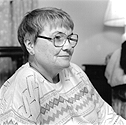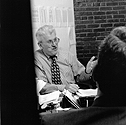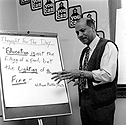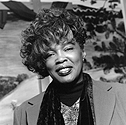








|
 |

|
 |

Frankly, the headlines in Knoxville
have been pretty bleak these days, from race relations to plant closings.
It's enough to make you feel as if nothing positive is happening here at
all. But, of course, that's not the case—there are still people out
there doing good things, filling needs in unique ways. Here are a handful
of Knoxvillians helping to make our city a better place to live, each in
a different manner. This isn't meant to be a comprehensive list, and these
aren't the only people who've taken it upon themselves to fill certain niches.
This is just a reminder that good things do still happen when good people
work hard. |

 |
|

Cathy Halpin
Cathy Halpin loves life. That much is apparent to everyone who meets her,
almost instantaneously. She's the type of person who can make you believe
in the existence of "vibes"—hers are strong, warm, and welcoming. She
clearly has an abundance of what can only be called joie de vivre.
How odd, then, that's she's chosen to devote her life to dealing with death.
As a full-time hospice chaplain for Covenant Healthcare—a position she's
held since 1993 when she pioneered the position at what was then Fort
Sanders—she's in the business of helping people die. The patients she
councels (and she deals with about 100 at any given time) have all received,
in effect, a death sentence—hospice clients must necessarily have been
diagnosed by a medical doctor as having only six months to one year to live.
She is also a Sister of the Divine Compassion, a Catholic nun, and as such
can offer the hospice patients the one commodity they most need, the thing
that the rest of the entire Covenant Healthcare system—with all its
vast resources—cannot provide: faith.
"I think faith is left out of the process of dying because of our medical
system," says Halpin, who spends her days traveling to the homes of her clients
under the auspices of Covenant's Homecare division. "We put all our trust
in doctors, and when people are dying, they need something else. They need
faith.
"You can have physical pain, and that can be controlled," she continues.
"But people also have emotional and spiritual pain—and that, no medication
is going to take care of. Faith makes dying gentler—and I want people
to die more gently.
"But even people who have a strong religious conviction that there is an
afterlife have fears," she says. "What they are afraid of is—are they
forgiven? Do they deserve to meet God? What's going to happen to their family
when they die?"
Halpin doesn't have the answers to those questions, but she's more than happy
to help her clients grapple with them. This, she says, is the key to a gentle
death. "I've seen people die horribly—not reconciling with people, not
talking to people, and really dreading that at the end," she says. "And I've
seen people die who have taken care of what they wanted to take care of,
they've said good-bye, and they see a loving God waiting for them."
And the latter, she says, is her goal. "I try to present a loving God because
I believe in Him," she says. "But I meet people where they're at. I never,
ever try to impose my beliefs. I'd say 99 percent of my patients think it
doesn't matter what religion we are because we all have the same God. I agree."
It's rewarding work, but her job comes with an inevitable downside: her patients
die (to the tune of 300 or 400 per year). But the upside makes it worth it.
"I just love the people," she says. "I love to hear their stories."
In particular, she loves working with children and teenagers, hosting support
groups to help them deal with the deaths of parents, siblings, and friends.
She has also, with Rena Walters, a guidance counselor at Brickey and Powell
Elementary Schools, instituted a peer-support program for teenagers. Its
name? Volunteen.
How does she make peace with all the death that surrounds her? "Death is
as important to me as birth—it's another phase of life," she says. "We
prepare for birth, and so often we don't with death. I help people prepare
for death."
—Hillari Dowdle |

 |
|

Ashley Capps
Make no mistake: Ashley Capps is in business to make money. If you were to
peek into his offices in the brownstone walkup off Market Street downtown,
you'd most likely see him on the phone working a deal. His mellifluous
voice—honed after 25 years as a WUOT disc jockey—burbles over the
line like warm brandy, insistent yet friendly: What's the band like? What
kind of support does it need? What about lodging? Any riders in the contract?
Capps is a promoter. That is to say, he books musicians and events for local
venues. But he is a promoter like no other in town. For the past seven years,
he and his company (A.C. Entertainment) have made Knoxville a more culturally
attractive town, bringing in performers of rare artistry and appeal. Whether
it's jazz and blues at the Bijou Theater, bluegrass at the Tennessee Theater,
or all-day, open-air music festivals on the World's Fair Site, he has combined
business savvy with a deep passion for music to increase this city's quality
of life. Without Capps, Knoxville would be a much more boring place to live.
"What's enabled us to build our business to the point that we have is the
fact that there was a real vacuum in Knoxville," says Capps. "We've learned
from other communities we've visited that the role cultural events play in
a successful community is extraordinary—it's very important. Many companies
will base their decisions on whether to relocate to a community on not merely
schools, and not only the economy, but also the array of cultural activities
that are available. Does it have a good symphony? Does it have a good opera?
Are there exciting events going on? And because there's been this void in
this community, we've been able to do a lot that I think is starting to have
an impact on downtown—and could have more of an impact in the future."
A.C. Entertainment's impact on Knoxville's cultural scene wasn't exactly
immediate. The company was formed in June of '91, not long after Capps finally
gave up trying to keep his legendary nightclub, ellaGuru's, afloat. ("That's
where I really got my education in the music business. Some of it was really
painful.") Not quite sure what to do with himself, he started getting phone
calls from agents who still wanted him to book their artists. He had some
experience organizing small concerts back in the '70s during his "music geek"
period as a UT grad student, so why not try something bigger? His first show
was Wynton Marsalis at the University of Tennessee—and it sold out.
From there, the company has grown to seven employees tackling an eclectic
array of cultural attractions, from Bob Dylan to Carrot Top.
"We're in the unique position of having both a popular music agenda and something
that's more of a fine arts agenda—and I love that," says Capps. "But
I do try to look at everything as a business deal. That's not to say I don't
have a vision or a desire to bring certain performers to town; sometimes
I'm wrong, and sometimes I get my butt kicked. But by necessity, I judge
things in terms of what people are interested in. That's the job I'm in—the
audience dictates the moves we make to a large degree. If the audience isn't
there, we're not doing anybody a favor."
Practical as he may profess to be, Capps has been doing a lot of favors for
a lot of people. His annual "Hot Summer Nights" concert series raises money
for The East Tennessee Foundation; last year's inaugural Smoky Mountain Jam
benefited the Friends of the Smoky Mountains; his concert with Lee Ann Rimes
and Bryan White was a fund-raiser for the News-Sentinel's Empty Stocking
Fund. And, in an important move for downtown's revitalization, his management
of the famed Tennessee Theater has made it an entertainment destination once
again, not only for live music but for—yes—movies. This has become
Capps' fondest accomplishment so far.
"I'm proud of what we've been able to do with the Tennessee Theater. Having
grown up here, the first movies I remember going to see were at the Tennessee.
I think it's a major asset to our community, and just the opportunity to
be involved in making the theater more active and hopefully bring it back
to the point where it's a real jewel—not only for Knoxville but East
Tennessee—that thrills me to death."
Of course, booking shows of any sort is a risky business. Balancing the profit
motive vs. aesthetic considerations can be a one-sided battle, but
Capps—even though he might protest otherwise—has consistently shown
vision and patience in bringing great music to town.
"Some of this boils down to my philosophy: People will come see quality stuff
if they're exposed to it. And it takes a while to build [interest] up," says
Capps. "We do a lot of things along those lines that other major promoters
generally don't fool with. And it has to do with our interest in music and
our relationship to the community—and the fact that it works, a lot
of the time."
Perhaps it's this relationship with the Knoxville community that has kept
Capps here, slugging it out, sometimes getting his "butt kicked." A lifelong
native, he truly loves Knoxville even as he sees its shortcomings.
"I like to tell people that Knoxville's one of the best places in the country
to live. And it's a big secret—some people laugh in your face when you
say that. But I really believe it. Having spent the last week in Los Angeles,
where there's certainly more to do, I'll reiterate that: Knoxville's just
a great place to live. And I'm glad to see that there's dialogue about making
it a better place to live and realizing some of the assets we have in our
community and making the best of it."
—Coury Turczyn |

 |
|

Mike Lewis
When Anne and David Inman moved into the Lakewood apartment building in November
1995, they didn't plan to stay long.
Built in 1931, the Magnolia Avenue building was infested with roaches and
rats. Tenants tossed their garbage in the hallways. Drug dealers and prostitutes
made their livings there. Menacing strangers loitered outside their apartment
door.
"It was awful. A drug dealer lived next door. She had traffic in and out
at all hours of the night," Anne Inman says. "It was always real dirty. I
was pregnant at the time, and it was not a good place for kids."
But eight months after the Inmans moved in, things began to change.
A new owner evicted all the riffraff, exterminated the bugs, and began to
fix up the Lakewood and its neighbor, the Shenandoah, both in the 2700 block.
He paved the parking lot, put streetlights out back, planted flowers in the
yard, and built an office the police could use at any hour of the day.
Anne had her child—a boy named Isaiah— and the Inman stayed in
their cozy two-bedroom apartment. She doesn't worry about the safety of her
son and her sister's children, as she baby-sits them on a snowy Wednesday
afternoon.
The main force behind the changes at the Lakewood and Shenandoah is Mike
Lewis and his partners, Fred Meunier and Darrell Tipton, both of Maryville.
They estimate they have spent $250,000 fixing up the buildings since they
bought them in June 1996. There is always a renovation project underway.
Now in the works are a laundry room and an ID-card entrance system.
Although they are profiting from the venture, their main motivation in buying
the buildings was altruistic, they say.
"Every human being is entitled to have a safe place to live," Meunier says.
"A child doesn't need to listen to gunfire overhead or watch their mothers
turn to prostitution or have cockroaches crawl over their food."
Just as important as the money they've spent are Lewis' determination and
commitment. A Powell resident who lived in a project as a teenager, he spends
10 to 12 hours a day at the buildings, seven days a week.
An easy-going man with a full head of gray hair and mustache, he could bend
your ear for hours. But he knows how to play tough as well, he says. Despite
several death threats, Lewis has stood his ground against the gangs and thugs
who controlled the building before he arrived.
That boldness nearly claimed his life.
Lewis had kept warning one drug dealer to stay off his property. But the
dealer persisted. So when he caught the man selling drugs one Friday night,
he went at him with a baseball bat, slugging him in the ribs. As the dealer
fell to the ground, he pulled a pistol and fired. The bullet grazed Lewis'
arm, but he was uninjured. The dealer ran off and has yet to return, Lewis
says.
"A tough stand had to be taken. If you don't follow the rules, you're not
going to live here. I don't tolerate drugs, prostitution, people beating
up on people, domestic situations," Lewis says. "It's my way or the highway."
The Rev. Larry Brinson, who lives in a home behind the apartment buildings,
says Lewis' efforts have had a tremendous effect on the neighborhood. "Before
he got there, our property values had dropped because of all the crime and
shootings," Brinson says. "He has eradicated that."
Walking through the building, Lewis brags about its architecture and sturdiness.
Solid red brick, the outside walls are 36 inches thick; the walls separating
apartments are 18 inches, he says. A soon-to-be occupied apartment is in
good shape, with both hardwood floors and new carpeting. The bathrooms are
as they were 67 years ago: with cast iron tubs, a cast iron pedestal sink
and checkered ceramic tiles.
Tenants come through Knoxville's Community Development Corporation. Applicants
must not have any drug or violent convictions and must meet low income
guidelines, says Debbie O'Mary, program coordinator for KCDC. Those who qualify
get help paying for their rent.
The program is slated to run at least into 1999, O'Mary says.
When it ends, Lewis hopes to take advantage of another federal program and
turn the buildings into condominiums for the poor.
Lewis envisions the residents slowly taking over his responsibilities. They
would establish an association, elect officers, and take control of their
community.
"I don't want folks to live in a government-funded project," Lewis says.
"I want them to have their own place."
—Joe Tarr |

 |
|

Jim Ford
It's Monday morning and time to make introductions in Jim Ford's "learning
skills" class at the old Knoxville High School on 5th Avenue. After hearing
from the veteran students, those who have been here for a week or two, Ford
turns to his two newcomers, a man in his 30s and a woman somewhat older.
The man, speaking in a strong, low voice but shyly keeping his eyes averted,
says his name is David. He has a high school diploma and had a successful
career training dogs in a military K-9 unit. He now trains dogs for the blind.
But he has accomplished all of that without really learning how to read or
write. "I pay people to write things for me, letters and applications," he
says. He's here this morning to take the first step toward changing that.
It's what Ford wants to hear. When David finishes speaking, Ford leads the
small class in an enthusiastic round of applause. A compact man of 52 with
the build and agility of a dancer—a profession he at one point
pursued—he settles quickly into his role as teacher. He tells the class
he loves working with adult students, and his demeanor shows it. He is friendly
with them, cajoling but not condescending, striking a tone between peer and
mentor that gives him authority without seeming threatening.
Ford is the first full-time teacher in Knox County's Adult Literacy program,
which is funded by the school system. But he's a lot more than that. He's
helped shape the whole approach of literacy education in Knox County. "To
me, things don't stop at eight hours," he says with an easy smile. "There's
always something to do. I'll wake up in the middle of the night, or my body
wakes me up, and you start to work on things. 'Cause there's just so much
to do."
He speaks in a quick, flat cadence that gives away his New Jersey upbringing.
What it doesn't give away is the colorful and varied career that followed.
Born in Montclair, he was raised with a purpose. His father and grandfather
had been semi-professional steppers, and for years—starting at the age
of 7—Ford planned to tap-dance in their footsteps. But a few years out
of school, after struggling through the Catskills circuit, he concluded
reluctantly that the competition was too strong and the opportunities too
few. It was the late '60s, so he got a jump on the draft board and enlisted
in the Air Force, serving four years (he was in Vietnam during the 1968 Tet
Offensive). When he got out, he put his military police experience to work
as an investigator for defense attorneys. He also married his wife, Blossom,
and had a son, Darin, now 25.
He missed the military, though, and re-enlisted part-time with the Air National
Guard. That eventually led to a training stint at McGhee Tyson's airbase,
which in turn inspired him to become a full-fledged military instructor.
It was after moving to Knoxville in that position eight years ago that he
began several community volunteering efforts, including with the fledgling
Friends of Literacy, a non-profit group that provides volunteers and raises
funds for the Adult Literacy program. In the literacy classrooms, Ford found
his long love of learning and teaching rewarded.
"What gets me is when you really say 'You can' to somebody and you really
watch the light turn on and you really see them take their first step and
try to write something out and realize that they have something to say,"
he says, seated in the snug classroom that he has decorated with all manner
of inspirational posters and proverbs.
He eventually earned his teacher certification, and after a year or so working
with talented and gifted children, he made his way back to the literacy program
as a full-time instructor.
But Jane Cody, the program's coordinator, says Ford's impact is just as great
outside the classroom as inside. He had been involved in "total quality"
assessment with the Air Force—he's still a quality adviser for the Air
National Guard unit at McGhee Tyson and was named one of the Air Force's
"12 Outstanding Airmen of the Year" in 1996 for recruiting efforts—and
is a certified state quality examiner. "What Jim has been able to do," Cody
says, "is really focus us in and help us get within a framework where we
can...start asking hard questions from an organizational standpoint: How
do we really do this? Could we do it better?"
The "learning skills" class Ford teaches four days a week is one outgrowth
of those kinds of questions. Before last September, the literacy program
had an orientation of just a few days for incoming students. Now, it puts
them through a month-long course to learn how to learn. By all accounts,
its effects have been dramatic—and students give a lot of the credit
to Ford.
"If I didn't understand something, he'd explain 'til we get it," says Annie
Shoopman, a young mother who just finished Ford's course and has moved on
to a reading class. "He lifted my spirits up, [that] there ain't nobody better
than me. Before, it was like everybody was better than me. He taught me to
be myself."
Ford—whose own reading preferences tend toward science fiction and
fantasy—is hard at work on that even on a sluggish Monday morning. "How
are y'all doing today?" he calls merrily to his class. "Terrible," one woman
responds. "Terrible?" he asks, raising his eyebrows. "But can we do better?"
"Yeah," the woman reluctantly concedes. "We've got to," Ford says, spinning
in place and then planting his feet and pointing both hands forward, forefingers
extended like pistols of positive thinking. "We've got to do better."
—Jesse Fox Mayshark |

 |
|

Tina Robinson
She's always been a praying woman. She prays for the sick, for the poor,
for prisoners in jail; for the struggling young working women whose children
she cares for all day long, for the President of the United States. Long
before she preached her trial sermon in 1995, Tina Robinson believed in the
power of prayer.
"I'd been called to serve (as a minister) since 1986, but didn't do it, because
I couldn't believe that God would call me—I never believed that I was
that special, that God would allow me to do something so great. It's the
most important job a person could have."
The first thing you notice about Tina Robinson, evangelist at Peace and Goodwill
Missionary Baptist Church, is that—after she's kissed the babies good-bye
and picked up the toys and washed the linens and the dishes at the end of
a long day at Tina's Tiny Tots—she is drop-dead, dressed-for-success
gorgeous as she gets ready to make her hospital rounds.
The next thing you notice is her non-stop smile.
"She lives her life for others," says county commissioner Diane Jordan, who
is Robinson's sister-in-law. "Tina is always on call, 24 hours a day, and
she helps people wherever she finds them. She helps with light bills, clothes,
food, lays hands on the sick ... even in her daycare center, she teaches
those kids moral principles and that God loves them..."
Robinson, 51, grew up in the now-vanished, pre-urban renewal East Knoxville
area called "the Bottom," where nobody had much, but neighbors looked out
for one another. One of 11 children, she recalls without a hint of bitterness
the hard times on Florida Street, where the family lived in a series of rental
homes.
"My mother always rented," she says. "We could never afford to buy. I think
McSpadden owned everything we rented... We went without a lot, but God would
always send somebody with a bag of groceries or used clothing that would
be like new to us..."
Times are better now, and Robinson, a graduate of Austin-East and Knoxville
Business College, and her husband, Paul, work hard at sharing what they have
with others. They shop for senior citizens, take food to homeless shelters.
Her Jeep Cherokee with the "WITNESS" license plate is, literally, a vehicle
to do good.
She is deeply concerned about the families of the children she keeps.
"These are mothers trying to get off welfare," she says. "And it's so hard
for them because when they go to work, the system takes their benefits away.
I believe that if the system would allow these little mothers, who are so
young, to stay on food stamps for awhile, and have classes on how to budget
their salary, it would be such a help. They have no experience, and putting
them out there on their own is like trying to give a newborn adult food.
They feel like they are being punished for getting a job..."
She knows there are some who believe women have no business preaching; and
she knows they are wrong.
"I think they need to read the Bible," she says, still smiling the non-stop
smile. "If God can use a donkey, he can use a woman. If it weren't for the
women today, there probably wouldn't be a church. Women have been upholding
the word of God more so than the men; and we don't have to do anything but
do the right thing. Then Christ will show up in us, and people will get to
see who we really are."
—Betty Bean
 |
|